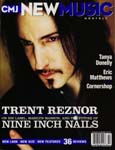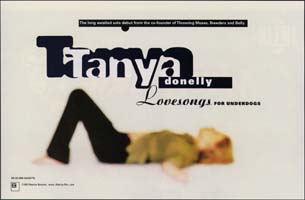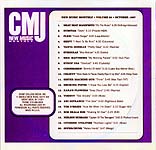CMJ volume 50 October 1997
![]()
| Features Tanya Donelly, Eric Matthews, Cornershop and of course, Trent Reznor of Nine Inch Nails ( on cover ) |

|
|
in my room
TANYA DONELLY |

|
( taken from page 10 )
![]()

It's hardly a secret that Donelly is no fan of the interview process. She's slow to open her heart, disinterested in stardom and perplexed by fans who idolize the singer instead of the songs: obscure and imagistic, each one like a Rubik's Cube of personal references, dreams and observations, keeping listeners at arm's length. "Sometimes I'm not even talking about myself, which should always be kept in mind," she says. "Sometimes it's coming from a perspective that has nothing to do with me and it's coming from something I read.
![]() "I'd like to be [more direct]," she continues. "I'm trying to simplify my life in many ways. And that's one area that I do concentrate on... and it does concern me sometimes. Part of the problem is sometimes I'll forfeit the story for the sound of the words, for the way the actual vowels and consonants move. I always envy those people that get the stories in those vowels and consonants. There are people that do it so well -- it's not abstract at all, and it sounds so perfect."
"I'd like to be [more direct]," she continues. "I'm trying to simplify my life in many ways. And that's one area that I do concentrate on... and it does concern me sometimes. Part of the problem is sometimes I'll forfeit the story for the sound of the words, for the way the actual vowels and consonants move. I always envy those people that get the stories in those vowels and consonants. There are people that do it so well -- it's not abstract at all, and it sounds so perfect."
![]() Donelly is at a crossroads in her recording career. After only two records -- the gold-selling Star and the star-crossed King -- Belly had suddenly lost its way. "We had always said that this isn't a permanent situation; we're not a U2-type band or an R.E.M.-type band. There's gonna come a point, because our tastes are so divergent, that it's gonna stop being healthy and start being unhealthy -- we knew it when the tour started... It didn't have anything to do with the failure of King. I think that if King had done really well, we would have broken up sooner," she notes.
Donelly is at a crossroads in her recording career. After only two records -- the gold-selling Star and the star-crossed King -- Belly had suddenly lost its way. "We had always said that this isn't a permanent situation; we're not a U2-type band or an R.E.M.-type band. There's gonna come a point, because our tastes are so divergent, that it's gonna stop being healthy and start being unhealthy -- we knew it when the tour started... It didn't have anything to do with the failure of King. I think that if King had done really well, we would have broken up sooner," she notes.
![]() "I cope by avoiding everybody!" Donelly says, perking up. "`OK, bye. I'm invisible now! I can't hear you, I can't hear you, I can't hear you!'... We fought. There were fights. When I'm in one, I definitely contribute to it. I can scream, that's for sure," she laughs. "The way we dealt with it was to just let everything fall apart. And then once it had, we realized it. Now we have rubble."
"I cope by avoiding everybody!" Donelly says, perking up. "`OK, bye. I'm invisible now! I can't hear you, I can't hear you, I can't hear you!'... We fought. There were fights. When I'm in one, I definitely contribute to it. I can scream, that's for sure," she laughs. "The way we dealt with it was to just let everything fall apart. And then once it had, we realized it. Now we have rubble."
![]() Emerging from that rubble, donelly recorded her solo debut in small batches last year, co-producing it with Wally Gagel (Fold Implosion) and her manager Gary Smith. She assembled a cast of new musicians, including her former Throwing Muses bandmate David Narcizo on drums. During the recording of the spazzy "Landspeed song," she notes, "Gary said, `Um, don't you think that sounds too much like Throwing Muses?' And David and I were like, `Well, I was in Throwing Muses, and so was he! We're allowed to sound like that for a second!'"
Emerging from that rubble, donelly recorded her solo debut in small batches last year, co-producing it with Wally Gagel (Fold Implosion) and her manager Gary Smith. She assembled a cast of new musicians, including her former Throwing Muses bandmate David Narcizo on drums. During the recording of the spazzy "Landspeed song," she notes, "Gary said, `Um, don't you think that sounds too much like Throwing Muses?' And David and I were like, `Well, I was in Throwing Muses, and so was he! We're allowed to sound like that for a second!'"
![]() Lovesongs for Underdogs is, at first listen, noticeably different from Donelly's earlier records. New sound sources, arangements and texutres, including tasteful touches of strings, all flatter the album's varied mix of songs. Her voice is more expressive and dynamic than ever before; her lyrics are still deliciously obscrue and dusky, but you can sense a stronger personality behind them. And, though Donelly has said in the past that she doesn't feel as though she has written a perfect love song, the albums's title suggests that she's tackled that dilemma. Not so. "It's funny -- there are only two love songs on there," she says. "I like the title just because it just sounds good. I think it's sweet and sad, but it's funny, too."
Lovesongs for Underdogs is, at first listen, noticeably different from Donelly's earlier records. New sound sources, arangements and texutres, including tasteful touches of strings, all flatter the album's varied mix of songs. Her voice is more expressive and dynamic than ever before; her lyrics are still deliciously obscrue and dusky, but you can sense a stronger personality behind them. And, though Donelly has said in the past that she doesn't feel as though she has written a perfect love song, the albums's title suggests that she's tackled that dilemma. Not so. "It's funny -- there are only two love songs on there," she says. "I like the title just because it just sounds good. I think it's sweet and sad, but it's funny, too."
![]() Still, she's not all happy. "All your heroes are whores," the mantra of the bittersweet "Mysteries Of The Unexplained," suggests that she's opening the scars left from Belly's end. "When I wrote that song, I was very aware that was probably going to be the perception," she notes, "and, unfortunately, it's bad timing for me to start complaining about radio butt-kissing, because it didn't work last time. It sounds like sour grapes, which is not really the point. That song is more about American media in general, and how filthy it can be. But in the chorus I'm saying other stuff" -- images of fish raining from the sky (an actual natural phenomenon) and crying statues, classic Donelly fare. "[You have to] remember the world is not solely pop culture, especially when you're part of the problem, like I am to a certain extent," she says. "You do have to really make sure you don't let your mind atrophy. There are other things going on outside of pop culture." CMJ
Still, she's not all happy. "All your heroes are whores," the mantra of the bittersweet "Mysteries Of The Unexplained," suggests that she's opening the scars left from Belly's end. "When I wrote that song, I was very aware that was probably going to be the perception," she notes, "and, unfortunately, it's bad timing for me to start complaining about radio butt-kissing, because it didn't work last time. It sounds like sour grapes, which is not really the point. That song is more about American media in general, and how filthy it can be. But in the chorus I'm saying other stuff" -- images of fish raining from the sky (an actual natural phenomenon) and crying statues, classic Donelly fare. "[You have to] remember the world is not solely pop culture, especially when you're part of the problem, like I am to a certain extent," she says. "You do have to really make sure you don't let your mind atrophy. There are other things going on outside of pop culture." CMJ
![]()
CD "PRETTY DEEP" BY TANYA DONELLY APPEARS ON THIS MONTH'S CD
( taken from pages 24 and 25 )
![]()
|
TANYA DONELLY CD
Lovesongs For Underdogs -- Reprise |

|
DATALOG: Released Sep. 9.
![]() Whether or not one finds it appealing, the main stylistic trademark of Tanya Donelly's post-Throwing Muses work, whether with Belly or on this solo debut, is fairly easy to spot -- the incongruous combination of her keening, will-o-the-wisp voice and the standard-but-meaty guitar sounds of slickly produced alt-rock (by longtime associate Gary Smith). The songs that cleave closest to this formula are maddeningly catchy, but a bit anonymous. A few songs in, though, one wishes for more artful, less ham-handed settings for Donelly's voice and relatively tough-minded lyrics. Surprisingly, it turns out that her songs are better served by turning up the dynamic contrast (as on the dissonant, surprisingly loose "Lantern" or the Stereolab-inflected "Bum") than by settling down into more "atmospheric" arrangements -- the acoustic numbers here drift into a hookless limbo, perhaps because her voice, when more exposed, tends to shade from charming into cloying. There are exceptions: the closing "Swoon" gets over on lyrics that recall the Muses' rush of cracked imagery ("There's always a green door/ And green gets you out... and proteins collide"). But otherwise, Donelly is most effective when indulging her knack for the big, inevitable chorus, especially when backed by even bigger, more inevitable guitars. She seems more at home as a glossy, left-of-center popstar than as a balladeering waif. -- Franklin Bruno
Whether or not one finds it appealing, the main stylistic trademark of Tanya Donelly's post-Throwing Muses work, whether with Belly or on this solo debut, is fairly easy to spot -- the incongruous combination of her keening, will-o-the-wisp voice and the standard-but-meaty guitar sounds of slickly produced alt-rock (by longtime associate Gary Smith). The songs that cleave closest to this formula are maddeningly catchy, but a bit anonymous. A few songs in, though, one wishes for more artful, less ham-handed settings for Donelly's voice and relatively tough-minded lyrics. Surprisingly, it turns out that her songs are better served by turning up the dynamic contrast (as on the dissonant, surprisingly loose "Lantern" or the Stereolab-inflected "Bum") than by settling down into more "atmospheric" arrangements -- the acoustic numbers here drift into a hookless limbo, perhaps because her voice, when more exposed, tends to shade from charming into cloying. There are exceptions: the closing "Swoon" gets over on lyrics that recall the Muses' rush of cracked imagery ("There's always a green door/ And green gets you out... and proteins collide"). But otherwise, Donelly is most effective when indulging her knack for the big, inevitable chorus, especially when backed by even bigger, more inevitable guitars. She seems more at home as a glossy, left-of-center popstar than as a balladeering waif. -- Franklin Bruno
FILE UNDER: Slickly guitar-driven introspection.
R.I.Y.L.: Belly, Belinda Carlisle, the Cardigans.
( taken from pages 38 and 39 )
![]()

( taken from page 53 )
![]()

"It was a combination of wanting to build up confidence and also really believing in the concept of a band," says TANYA DONNELY, explaining why she's waited until now to release a solo album. After the breakup of Belly, Donelly enlisted the aid of former Pixies durmmer David Lovering, Throwing Muses drummer David Narcizo, and former Juliana Hatfield Three bassist Dean Fisher (who's also her husband). Along with a few other collaborators, the group recorded Lovesongs For Underdogs (Reprise), on which "Pretty Deep" appears. ( See review, pg. 38, and interview, pg. 24. )
( taken from page 74 )
![]()